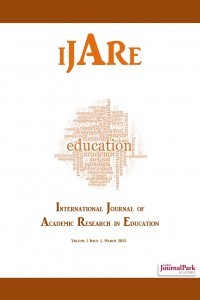Readers Typology: Can Poor Readers Advance to Good Readers?
Readers Typology: Can Poor Readers Advance to Good Readers?
Cognitive reading strategies, Metacognitive reading strategies, Readers typology, Reading comprehension Think-aloud protocol,
___
- Bailey, K. M. (1991). Diary Studies of Classroom Language Learning: The Doubting Game and the believing Game. Retrieved from http://eric.ed.gov/?q=kathleen+bailey&ft=on&id=ED367166
- Brown, A. L., Bransford J. D., Ferrara R. A., & Campione J. C. (1982). Learning, Remembering, and Understanding. Technical Report No. 244.
- Carver, R. P. (1985). How Good Are Some of the World's Best Readers?. Reading Research Quarterly, 20 (4), 389–419. doi.org/10.2307/747851.
- Chamot, A. U. (1999). The learning strategies handbook. White Plains, NY: Longman.
- Cohen, A. D. (1995). Second language learning and use strategies: Clarifying the Issues. Research Report. Revised Version. Minnesota.
- Ellis, R. (1985). Understanding second language acquisition. Oxford; New York: Oxford University Press.
- Ellis, R. (2015). Understanding Second Language Acquisition. Oxford. Oxford University Press.
- Garner, R. (1980). Monitoring of understanding: An investigation of good and poor readers’ Awareness of induced miscomprehension of text. Journal of Literacy Research, 12 (1), 55-63.
- Garner, R. & Alexander, P. (1989). Metacognition: Answered and Unanswered Questions. Educational Psychologist, 24 (2), 143-158. doi:10.1207/s15326985ep2402_2.
- Grenfell, M., & Harris, V. (1999). Modern Languages and learning strategies: In Theory and Practice. London: Routledge.
- Harvey, S., & Goudvis, A. (2013). Comprehension at the core. Reading Teacher, 66 (6), 432, 439. doi:10.1002/TRTR.1145.
- Huang, S. (2006). Reading English for academic purposes – What situational factors may motivate learners to read? System, 34 (3), 371-383. doi:10.1016/j.system.2006.04.006.
- Keene, E. O., & Zimmermann, S. (2013). Years later, comprehension strategies still at work. The Reading Teacher, 66 (8), 601-606.
- Kendeou, P., Smith, E. R., & O’Brien, E. J. (2013). Updating during reading comprehension: Why causality matters. Journal of Experimental Psychology. Learning, Memory, and Cognition, 39 (3), 854-865.
- Krashen, S. D., & Terrell, T. D. (2000). The natural approach: language acquisition in the classroom. England: Longman.
- Kutluturk, S. (2016). An Investigation on the Effects of Using Cognitive and Metacognitive Strategies to Enhance University Students’ Reading Skills. Unpublished Master’s Thesis, Çağ University, Mersin, Turkey.
- Kutluturk, S., & Yumru, H. (2017). Cognitive and metacognitive strategy training to enhance freshmen’s reading skills. International Journal of Language and Literature, 5(1), 7-15.
- Macnamara, J., (1971). The Cognitive Strategies of Language Learning. In "Conference on Child Language," preprints of papers presented at the Conference, Chicago, Illinois, November 22-24, p471- 484.
- McDonough, J., Shaw, C., & Masuhara, H. (2013). Materials and methods in ELT: A teacher’s guide (3rd ed.). West Sussex, UK: Wiley & Blackwell.
- Merriam, S. B. (2002). Qualitative research in practice: Examples for discussion and analysis. San Francisco, CA: Jossey-Bass.
- O’Malley, J. M., & Chamot, A. U. (1990). Learning strategies in second language acquisition. Cambridge University Press.
- Oxford, R. (1990). Language learning strategies: What every teacher should know. Boston: Heinle & Heinle. Rubin, J. (1975). What the “Good Language Learner” Can Teach Us. TESOL Quarterly, 9 (1), 41.
- Schoenbach, R., Greenleaf, C., & Murphy, L. (2012). Reading for understanding: How reading apprenticeship improves disciplinary learning in secondary and college classrooms. John Wiley & Sons.
- Snow, C. E., (2002). Reading for Understanding: Toward an R&D Program in Reading Comprehension. Santa Monica, CA: RAND Corporation.
- Soars, L., & Soars, J. (2011). New headway elementary, fourth edition materials. UK: Oxford University Press.
- Spring, C. (1985). Comprehension and study strategies reported by university freshmen who are good and poor readers. Instructional Science, 14 (2), 157. doi:10.1007/BF00052395.
- Weinstein, C. E., & Mayer, R. E. (1983). The Teaching of Learning Strategies. In Innovation abstracts. 1983. p. n32.
- Yaylı, D. (2010). A think-aloud study: Cognitive and metacognitive reading strategies of ELT Department students. Eurasian Journal of Educational Research, 38, 234-251.
- Zhang, L. (2018). Metacognitive and cognitive strategy use in reading comprehension. Springer.
- Yayın Aralığı: Yıllık
- Başlangıç: 2015
- Yayıncı: Süleyman Nihat ŞAD
Preservice Science Teachers’ Perceptions towards Scientists
Umit YAKAR, Ayfer SÜLÜ, Mehmet PORGALI, Nuran ÇALIŞ
EMI or TMI? A Study on the Effect of English Medium Instruction on Students’ Success and Motivation
Ayşe YILMAZ VİRLAN, Dilara DEMİRBULAK
Ayşenur AĞAOĞLU, Süleyman Nihat ŞAD
Readers Typology: Can Poor Readers Advance to Good Readers?
Elementary Teacher Candidates’ Opinions About Science and Scientific Research
Usage of Benchmarking as Organizational Development Technique in Educational Organizations
